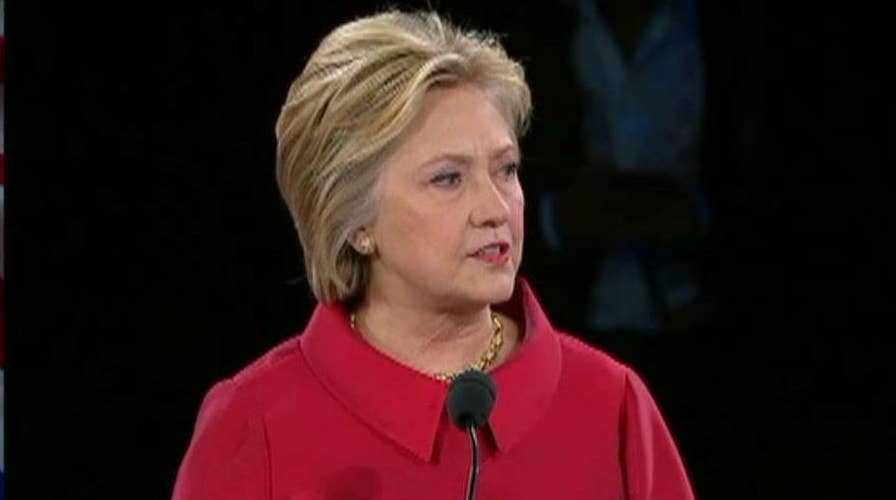Clinton takes aim at Trump in AIPAC speech
Strategy Room: Jeanne Zaino and Tom Basile react to Clinton's speech, preview Trump's remarks
Democratic presidential front-runner Hillary Clinton openly challenged Donald Trump’s commitment to the U.S.-Israel alliance during an address Monday before the country’s most influential pro-Israel group, slamming his call to be “neutral” in peace talks and offering what could be a preview of the general election battle.
Speaking to the American Israel Public Affairs Committee policy conference, the former secretary of state took several thinly veiled shots at the Republican primary front-runner -- who is set to addres AIPAC Monday evening -- as she said the next president needs to be steadfast on support for Israel.
“We need steady hands – not a president who says he’s neutral on Monday, pro-Israel on Tuesday and who knows what on Wednesday, because everything’s negotiable,” Clinton said. “Israel’s security is non-negotiable.”
Her comments were a clear reference to the billionaire businessman’s recent statements. In February, Trump said he'd be "sort of a neutral guy" on Israel, sparking criticism from Republican rivals. While the U.S. is officially neutral in the Middle East conflict, his statement was a marked rhetorical departure for U.S. presidential candidates.
Trump, though, maintains he is strongly pro-Israel and is only talking about neutrality in order to negotiate a resolution to the Israeli-Palestinian conflict.
Republican National Committee Chairman Reince Priebus rebuked Clinton for her remarks Monday, pointing to her support for the Iran nuclear deal in questioning her commitment to Israel as well.
“Hillary Clinton’s speech was an attempt to whitewash a record of undermining Israel’s interests when she was Secretary of State,” he said in a statement. “Only a Republican president will reverse this administration’s break with Israel and renew a steadfast commitment which has characterized American foreign policy for decades.”
Clinton, in her remarks Monday, went on to say America cannot be “neutral” on Israel’s security, adding, “Some things aren’t negotiable, and anyone who doesn’t understand that has no business being our president.”
She spoke as almost every remaining presidential candidate prepared to take the AIPAC stage Monday. Only Democratic rival Bernie Sanders -- trying to become the first Jewish candidate to win a major party's presidential nomination -- is skipping the event, campaigning in Western states ahead of Tuesday’s primary contests.
Republicans Ted Cruz and John Kasich are set to address the pro-Israel group later in the day. But most eyes in the audience of thousands will be on GOP front-runner Trump, who is the wild card in the field when it comes to speaking about the U.S.-Israel alliance.
"Trump has said a lot of things about Israel over the years, most of it favorable, but some of it more ambiguous," said Josh Block, a former AIPAC official who now heads The Israel Project. "This will be an opportunity to address the ambiguity before a serious foreign policy audience."
AIPAC bills itself as nonpartisan and has never endorsed a candidate. Yet the organization has delved into highly partisan political debates over issues of interest to Israel, most recently and notably the Iran nuclear deal, which it vehemently opposed. In that, it is at odds with ardent deal supporters Clinton and Sanders, and to a certain degree, with Kasich, the lone Republican who has not said he would automatically rescind the pact.
Trump and Cruz have promised, if elected, to rip up the agreement.
Beyond that, Cruz has pledged absolute support for Israel, but Trump has been far from clear on how he would approach matters of deep concern to pro-Israel voters.
Unlike Cruz, Trump has not said he would move the U.S. Embassy from Tel Aviv to Jerusalem, a perennial Republican campaign promise, and, unlike Cruz, he has said he will be neutral as a negotiator in trying to resolve the Israeli-Palestinian conflict. Cruz's campaign website features an entire section on Israel; Trump's does not address it at all.
On Mideast peace talks, Trump says: "You understand a lot of people have gone down in flames trying to make that deal. So I don't want to say whose fault it is -- I don't think that helps." He also put off calls to clarify his position on the status of Jerusalem.
Trump said Sunday on ABC's "This Week" he will lay out his ideas for a peace deal in Monday's speech.
Clinton, meanwhile, has a long history in the Middle East, including overseeing as secretary of state the Obama administration's first attempt to broker Israeli-Palestinian peace with former Sen. George Mitchell as envoy. Her stance against Jewish settlements on land claimed by the Palestinians has been criticized by some in the pro-Israel community, but she has been received warmly by pro-Israel groups in the past, not least because she has a track record.
Trump, on the other hand, has something of a checkered record with pro-Israel Republicans. He drew boos last year from the Republican Jewish Coalition when he refused to take a stance on the embassy location.
Some have announced they will protest Trump, if not by disrupting his speech, by walking out. South Florida Rabbi Jeffrey Salkin is among a group of about 40 rabbis that plans to boycott Trump's address Monday evening, saying his appearance "poses political, moral and even spiritual quandaries."
Others have said the speech will be an important opportunity to hear Trump explain his views.
"It's important that the lobby keep itself on decent terms with whatever powers govern in Washington," commentator J.J. Goldberg wrote in the Jewish newspaper The Forward.
The Associated Press contributed to this report.





